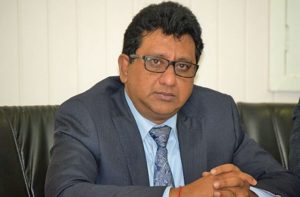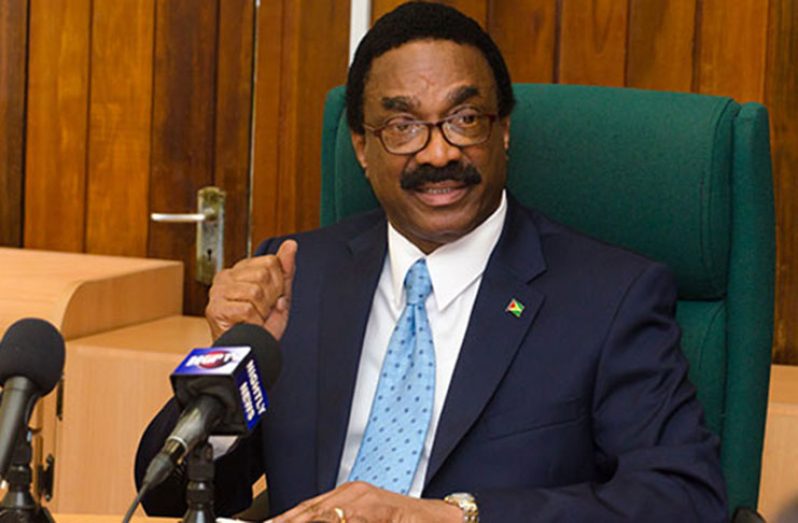PRESIDENTIAL Immunity and the question of whether the list submitted by the leader of the opposition is still valid if it includes persons who are deemed unacceptable to the President, were among the issues brought to the fore when the final round of arguments were made in the Court of Appeal in the Guyana Elections Commission (GECOM) Chairman appointment case.
After close to two hours of arguments on Tuesday, by the Attorney General and Minister of Legal Affairs, Basil Williams and his team, who are representing the interest of the State, and Attorney-at-Law, Anil Nandlall, who is representing the appellant Zulfikar Mustapha, Chancellor of the Judiciary (ag), Justice Yonette Cummings-Edwards announced that the decision would be handed down on Thursday, October 18, 2018 at 11:00hrs in the Appellate Court.
The appeal seeking to overturn the ruling of Chief Justice (ag), Roxane George-Wiltshire, which upheld the appointment of Chairman of GECOM, Justice (Ret’d) James Patterson, is being heard by the Chancellor (ag, Justice Dawn Gregory and Justice Rishi Persaud.
Before the date for the decision was announced, the parties involved, in their arguments, responded to four questions put forward by the Appellate Court.
Those questions were: (1) Whether the Orders sought in paragraphs III and IV in Fixed Date Application dated the 23rd day of October, 2017, or the effect of those Orders can be granted by way of these proceedings; (2) whether Article 177 has any bearing on the President’s role under Article 161 (2); (3) whether the role of the leader of the opposition in submitting a list under Article 161 (2) is restricted only to the category of “other fit and proper persons”; and whether the list is still valid, if not all six persons are deemed not unacceptable.
In opening the arguments on Tuesday, Nandlall, in response to the first question, argued that A Fixed Date Application is one of only two ways to commence proceedings under the Civil Procedure Rules 2016.
He pointed out that Rule 8.01 (2) of the CPR specifically mandates for a Fixed Date Application to be used: (i) when the relief claimed is urgent; (ii) if it is in respect of a matter where it is unlikely that there will be material facts in dispute; or (iii) the matter can be determined at the date fixed for the hearing based on Affidavit evidence.
“It is submitted that this matter satisfies all these requirements and therefore could only be commenced by way of a Fixed Date Application,” Nandlall told the court.
He further argued that once the jurisdiction of the court is properly invoked and the correct vehicle is used, then the High Court has an unlimited and original jurisdiction to grant any orders claimed by the parties. In building his case, Nandlall turned the court’s attention to Sections 24 and 25 of the High Court Act, Chapter 3:02.
“Subject to the provisions of any written law, the court may in any cause or matter make any order as to the procedure to be followed or otherwise, which the Court considers necessary for doing justice in the cause or matter, whether that order has been expressly asked for by the party entitled to the benefit thereof or not,” the attorney read aloud as he quoted Section 24 of the High Court Act, Chapter 3:02.
NO ONE ABOVE THE LAW
Pointing to the Constitution of Guyana, Nandlall emphasised that no one is above the law. “No matter how powerful one may be; Ye maybe high, Ye is never higher than the law…Though the President enjoys immunity personally from suit, his actions are not immune from suit,” he posited.
In response to the second question, Nandlall argued that Article 177 of the constitution addressed the process of electing a President.
Meanwhile, Nandlall responded in the negative to the question whether the role of the leader of the opposition in submitting a list under Article 161 (2) is restricted only to the category of “other fit and proper persons.”
“The clear letter, spirit and intent of the framers of the constitution is to permit and authorise the leader of the opposition to include on the list of six persons, persons who hold or have held office as judge of a court having unlimited jurisdiction in civil and criminal matters in some part of the Commonwealth; or a court having jurisdiction in appeals from any such court; or who is qualified to be appointed as any such judge, or any other fit and proper person. I see no juridical or lingual basis for the restriction suggested in the question,” the attorney told the court.

He argued that prior to the Carter Formula, the President made unilateral appointments and included a narrow pool of persons. The Carter formula, he said, allowed for the expansion of the pool from which to choose, and included the opposition to allow for consensus on the part of the opposition leader and the President.
On the final issue, Nandall reiterated his earlier arguments that neither the President nor the opposition leader is entitled to a “perfect candidate.” He argued that the President could have chosen from the list on the basis that it may have had one or more persons who were found not unacceptable to him.
Attorney General Williams, while thanking the court for posing the questions to parties involved, said the President’s act of appointing Justice Patterson Chairman of GECOM was done during the performance of his office under Article 182 (1) and Article III (1) of the constitution, as he responded to the first question on the Fixed Date Application.
WOULD BE BURDENSOME
He further pointed to Article 89 of the constitution as he addressed the issue of Presidential Immunity in Guyana, noting that the current system which exists would be eroded if the President is exposed to the scrutiny of the judicial system. “Without this protection, the President would be obligated to justify every contestable action. This would subject the President to control and inspection by the judiciary and he would be burdened by countless civil and criminal actions,” he emphasised.
The attorney general made it clear that the President is not above the law; however, he has special protection as he executes his functions in the interest of the people.
As a result, he said the President is not personally answerable to any court, and it is not for the attorney general to answer for the President. “The constitution makes no provision for the attorney general to answer for decisions of the President,” Williams posited, while pointing out that the State Liability Proceedings Act Chapter 6:05 of the Laws of Guyana does not empower the attorney general to be named as a representative of, or for the President in any court.
Like Nandlall, Williams responded in the negative to the second question posed by the Appellate Court, which dealt with Article 177.
The attorney general was backed by the Solicitor General Kim Kyte and Barbadian Queen Counsel, Ralph Thorne.
Kyte,in addressing the role of the leader of the opposition in presenting a list of six nominees to the President, said that role is not restricted to the category of “other fit and proper persons” as she pointed to Article 161 (2) which provides three categories.
“What this has done your honours, is extend the categories of persons from which the leader of the opposition can select to present the list to the President. So there is the judicial category from which he can choose; and there is the category of other fit and proper persons,” she said.
Turning the court’s attention to the fourth and final question on the validity of the list if it does not contain six acceptable names, the solicitor general said the state has argued in the court that the President should be given a fair choice from amongst six persons.
Kyte argued that it is the entire list which must be acceptable to the President and not just some of the names on the list. She said the President’s options would be limited if he is provided with unacceptable and acceptable names. “The list must maintain its integrity in its fullness,” she told the court.
In an effort to build her case, she alluded to the ruling of the learned Chief Justice in the case of Marcel Gaskin (page 25-26). In that ruling, the chief justice said, “Simply, where the President has determined that some persons on the list are unacceptable, he is not obliged to select anyone else from the six names for appointment.”
President David Granger was provided three lists totalling 18 persons, which he has rejected on the basis that the lists were not acceptable.




.png)









